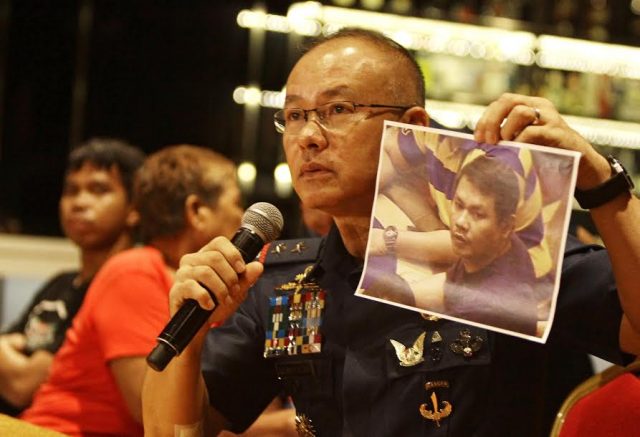
MANILA – After his dismissal from government service in May 2014 for questionable wealth, Department of Finance tax specialist Jessie Carlos apparently raced further down the road to perdition – being mired in gambling and domestic problems until the June 2 attack he mounted on Resorts World Manila that left 38 dead, including himself.
And, if a 2014 report in the Philippine Star were any indication of his financial profile and behavior, Carlos had been prone to incurring huge debts while boldly making big acquisitions even before he was dismissed on the basis of a complaint by the DOF’s integrity unit.
Police on Sunday identified Carlos, 42, as the lone perpetrator of the shooting and fire attacks on the casino hotel in Pasay City that began just past midnight Friday.
The investigation took a definite direction after Carlos’ family, seeing images of the gunman on TV after the mayhem, went to the police early Sunday morning, bringing along old photos and identification documents, among others.
According to NCRPO chief, Gen. Oscar Albayalde, probers had established, based on witness testimonies and physical evidence, that Carlos had gone alone, by taxi, to RWM, from the family home in Sta.Cruz, Manila.
Once there, he gained entry by showing his firearm to a lady guard who got scared and ran. Then, Carlos proceeded to the gaming area on the second floor, where he set alight gaming tables, later torching as well some slot machines.
He then went to the secure area where the casino chips are kept, and stuffed an estimated P113 million worth of platinum chips in his backpack, but later abandoned the bag when he was hit by a bullet in the face while trading fire with responding policemen.
Carlos later proceeded to a room on the fifth floor, where he once again torced a blanket, apparently as diversion, before setting himself on fire and shooting himself.
Albayalde said investigation showed Carlos had racked up some P4 million in gambling debts in one casino he had frequented (not Resorts World), and where he was barred since April this year.
He and his wife Jen had separated over his financial recklessness, occasional tantrums, among others, though he continued to stay in the family home in Sta. Cruz, Manila. They have three children.
His parents attended the press conference called by Albayalde Sunday morning, and apologized to the families of the victims, who included hotel employees and guests. The father insisted his son had never shown any inclination toward any political or extremist group. He described his son as “mabait [good]” adding that his one single undoing was his addiction to gambling.
One relative recalled, though, that he once threw a tantrum when he was not immediately accommodated in his request for a VIP card at a casino hotel.
Questionable wealth earns dismissal
If the Ombudsman’s decision dismissing Carlos were any indication, the road to perdition could have begun even before his 2014 firing from the Department of Finance, where he worked as tax specialist under the One-Stop Shop Center.
The Ombudsman had decided on a complaint filed by the DOF’s Revenue Integrity Protection Service (RIPS) in December 2011, according to a report in the Philippine Star on May 6, 2014 by Zinnia dela Peña.
“In a separate decision, the anti-graft agency ordered the filing of criminal charges against Carlos for violation of Republic Act 3019, the Anti-Graft and Corrupt Practices Act in relation to RA 6713, the Code of Conduct and Ethical Standards for Public Officials and Employees, Article 171(4) (Falsification), and Article 183 (Perjury) of the Revised Penal Code,” said the PhilStar report.
The DOF’s RIPs investigation was triggered by misdeclarations in Carlos’s Statement of Assets, Liabilities and Networth (SALN) in 2007, which failed to list certain real properties, business interest, and a vehicle.
Part of the PhilStar report said: “The Office of the Ombudsman found Jessie Javier Carlos of the One-Stop Shop Inter-agency Tax Credit and Duty Drawback Center guilty of grave misconduct and neglect of duty for not declaring his house and lot in Manila in his SALNs from 2003 to 2006, his Toyota Innova SUV in his 2007 SALN, and his business interest in his 2010 SALN.
“Carlos’ civil service eligibility was also canceled, his retirement benefits forfeited, and he was perpetually disqualified ffrom reemployment in the government.
“Carlos was found to have purchased two farm lots in Tanauan City, Batangas for P4 million in cash in 2010. He earned P2.46 million from 2001 to 2011.”
The Office of the Ombudsman was intrigued by Carlo’s ability to rack up new acquisitions despite a heavy debt load. The PhilStar quoted the Ombudsman: “With respect to respondent’s liabilities, noticeable is that his credit card liabilities in the amounts of P600,000 and P4 million, respectively, remained dormant for several years, with the latter loan increased to P5 million in 2010. Noteworthy to mention is the fact that notwithstanding the huge credit he incurred, he was not deterred from obtaining another vehicle in 2010, a Hyundai Starex van worth P1.6 million.
“To our mind, the incurrence of tremendous loans posed these questions: (1) how can he be able to pay these loans and obtain some more when he has no other business interest or financial connections declared in his SALNs from 2000 to 2010? (2) who are his creditors who can lend him millions of pesos without him paying any single centavo for years?”
Graft-ridden office
Notably, the DOF had in the past decade been aggressively cleaning up its One-stop Shop Center, which in the early nineties got embroiled in the multi-billion tax-credit scam that was investigated by the Senate Blue-Ribbon committee, and later, by the Ombudsman. The cases against several officials of the center were subsequently tried in the Sandiganbayan.
Since that tax-credit scandal, the DOF had kept close track of the center as part of integrity reforms, considering the huge sums the center processes daily.
In the tax credit scam scandal, a Filipino-Chinese businessman, Faustino Chingkoe, was believed by probers to have used corrupt cohorts in the center to misuse tax credit certificates issued to garments manufacturers. The certificates were used for businesses that are totally unrelated to garments.
Chingkoe, once reported to be holding five passports of different nationalities, fled and is believed to be hiding in Canada.
While Carlos’ name did not crop up in any of the tax-credit scam cases (he is only 42, and the scandal broke in the early nineties), the Ombudsman’s 2014 decision nonetheless provides a window to the kind of assets that a posting at the center can bring, assuming one is willing to use it for lucrative purposes.
A portion of the Ombudsman’s decision as reported by PhilStar said: “The failure to declare some of his assets at the time these assets were actually acquired and/or registered under his name and his scheme of claiming several indebtedness without giving particulars i.e. from whom he acquired these enormous loans, can also reflect his evil desire to conceal his ill-gotten wealth.”









